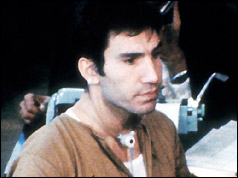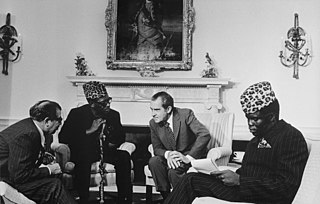
Patrice Émery Lumumba, born Isaïe Tasumbu Tawosa, was a Congolese politician and independence leader who served as the first prime minister of the Democratic Republic of the Congo from June until September 1960, following the May 1960 election. He was the leader of the Congolese National Movement (MNC) from 1958 until his execution in January 1961. Ideologically an African nationalist and pan-Africanist, he played a significant role in the transformation of the Congo from a colony of Belgium into an independent republic.

Frank Warren Snepp, III is a journalist and former chief analyst of North Vietnamese strategy for the Central Intelligence Agency (CIA) in Saigon during the Vietnam War. For five out of his eight years as a CIA officer, he worked as interrogator, agent debriefer, and chief strategy analyst in the United States Embassy, Saigon; he was awarded the Intelligence Medal of Merit for his work. Snepp is a former producer for KNBC-TV in Los Angeles, California. He was one of the first whistle blowers who revealed the inner workings, secrets and failures of the national security services in the 1970s. As a result of a loss in a 1980 court case brought by the CIA, all of Snepp's publications require prior approval by the CIA.

The National Front for the Liberation of Angola is a political party and former militant organisation that fought for Angolan independence from Portugal in the war of independence, under the leadership of Holden Roberto.

The Angolan War of Independence, known as the Armed Struggle of National Liberation in Angola, was a war of independence fought between the Angolan nationalist forces of the MPLA, UNITA and FNLA, and Portugal. It began as an uprising by Angolans against the Portuguese imposition of forced cultivation of only cotton as a commodity crop. As the resistance spread against colonial authorities, multiple factions developed that struggled for control of Portugal's overseas province of Angola. There were three nationalist movements and also a separatist movement.

Costas Georgiou, also known by his alias Colonel Callan, was a Cypriot-born British mercenary executed in Angola following the Luanda Trial for activities during the civil war phase of the Angolan War of Independence.
The Luanda Trial was a trial held in Luanda, Angola, in June 1976 during the Angolan Civil War. Thirteen Western mercenaries were sentenced to either long prison terms or execution by firing squad.

Álvaro Holden Roberto was an Angolan politician who founded and led the National Liberation Front of Angola (FNLA) from 1962 to 1999.

The Angolan Civil War was a civil war in Angola, beginning in 1975 and continuing, with interludes, until 2002. The war began immediately after Angola became independent from Portugal in November 1975. It was a power struggle between two former anti-colonial guerrilla movements, the communist People's Movement for the Liberation of Angola (MPLA) and the anti-communist National Union for the Total Independence of Angola (UNITA).

Operation Savannah was the South African code name for their military incursion into Angola in 1975–1976. It was part of the South African Border War and arose due to the Angolan War of Independence. The operation also materially influenced the subsequent Angolan Civil War. South African forces invaded deep into Angola with the objective of driving the MPLA, Soviet and Cuban forces out of southern Angola so as to strengthen the position of UNITA, the main opponent of the MPLA and an ally of South Africa.

Angola and the United States have maintained cordial diplomatic relations since 1993. Before then, antagonism between the countries hinged on Cold War geopolitics, which led the U.S. to support anti-government rebels during the protracted Angolan Civil War.

Mobutu Sese Seko's foreign policy emphasized his alliance with the United States and the Western world while supposedly maintaining a non-aligned position in international affairs. Mobutu ruled the Republic of the Congo and then Zaire as president for 32 years, from 1965 to 1997.
Operation IA Feature, a covert Central Intelligence Agency operation, authorized U.S. government support for Jonas Savimbi's National Union for the Total Independence of Angola (UNITA) and Holden Roberto's National Liberation Front of Angola (FNLA) militants in the Angolan Civil War. It was closely linked with parallel efforts by South Africa and Zaire. President Gerald Ford approved the program on July 18, 1975 despite strong opposition from officials in the State Department and the CIA. The program's discovery shocked Congress into barring further U.S. involvement in Angola's Civil War through the Clark Amendment.
This article deals with the activities of the Central Intelligence Agency (CIA) of the federal government of the United States that constitute violations of human rights.
The 1970s in Angola, a time of political and military turbulence, saw the end of Angola's War of Independence (1961–1975) and the outbreak of civil war (1975–2002). Agostinho Neto, the leader of the People's Movement for the Liberation of Angola (MPLA), declared the independence of the People's Republic of Angola on November 11, 1975, in accordance with the Alvor Accords. UNITA and the FNLA also declared Angolan independence as the Social Democratic Republic of Angola based in Huambo and the Democratic Republic of Angola based in Ambriz. FLEC, armed and backed by the French government, declared the independence of the Republic of Cabinda from Paris. The National Liberation Front of Angola (FNLA) and the National Union for the Total Independence of Angola (UNITA) forged an alliance on November 23, proclaiming their own coalition government based in Huambo with Holden Roberto and Jonas Savimbi as co-presidents and José Ndelé and Johnny Pinnock Eduardo as co-Prime Ministers.

The Cuban intervention in Angola began on 5 November 1975, when Cuba sent combat troops in support of the communist-aligned People's Movement for the Liberation of Angola (MPLA) against the pro-western National Union for the Total Independence of Angola (UNITA) and National Liberation Front of Angola (FNLA). The intervention came after the outbreak of the Angolan Civil War, which occurred after the former Portuguese colony was granted independence after the Angolan War of Independence. The civil war quickly became a proxy war between the Eastern Bloc led by the Soviet Union and the Western Bloc led by the United States. South Africa and the United States backed UNITA and the FNLA, while communist nations backed the MPLA.

Soviet–Angolan relations were close until the Angolan government renounced Marxist-Leninism in 1990 and adopted a pro-Western foreign policy. The close, personal relationship between President Agostinho Neto and Cuban leader Fidel Castro complicated the Soviet Union's involvement in the Angolan Civil War and foiled several assassination attempts against Neto.

The Battle of Quifangondo was fought on 10 November 1975, near the strategic settlement of Quifangondo, Luanda Province, between the People's Armed Forces of Liberation of Angola (FAPLA), armed wing of the People's Movement for the Liberation of Angola (MPLA), and the National Liberation Army of Angola (ELNA), armed wing of the National Liberation Front of Angola (FNLA). The engagement marked the first major deployment of rocket artillery in the Angolan Civil War, as well as the last serious attempt by ELNA forces to seize Luanda, the Angolan capital. It occurred on the last day of Portuguese colonial rule in the country, which formally received independence only hours later.
This article deals with the activities of the U.S. Central Intelligence Agency (CIA) in Angola. The list of activities may be incomplete due to the clandestine nature of the subject matter.
The Congo, short for the Democratic Republic of the Congo, is an equatorial country located in central Africa. As of July 2018, the CIA World Factbook lists the Congo containing over 85 million inhabitants representing over 200 African ethnic groups. French is the country's official language, and Catholics comprise the largest religious group at fifty percent. The Congo was colonized by King Leopold II of Belgium in 1885, and known as Belgian Congo until it gained independence. Both the Soviet Union and United States had kept a close watch on the mineral-rich country until on June 30, 1960, the Congo finally gained independence under the democratically elected Prime Minister Patrice Lumumba. Lumumba was a charismatic nationalist who led the only party in parliament with a nationwide base, rather than a regional or ethnic base.
George Washington Bacon III was an American soldier and intelligence officer. He served as a Green Beret in the U.S. Army, Paramilitary Officer in the Central Intelligence Agency (CIA), and finally as a mercenary soldier.












